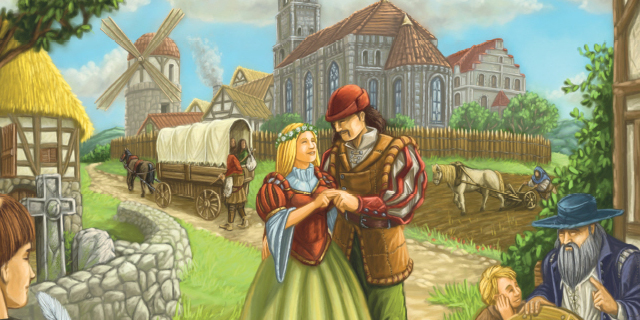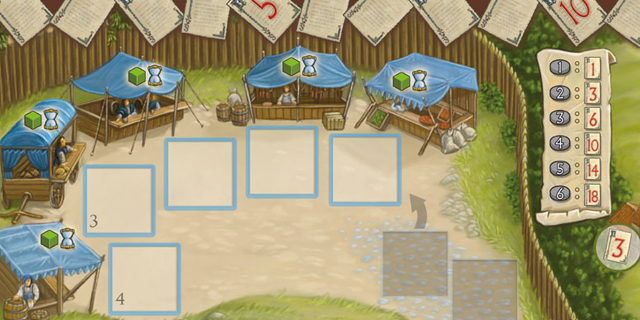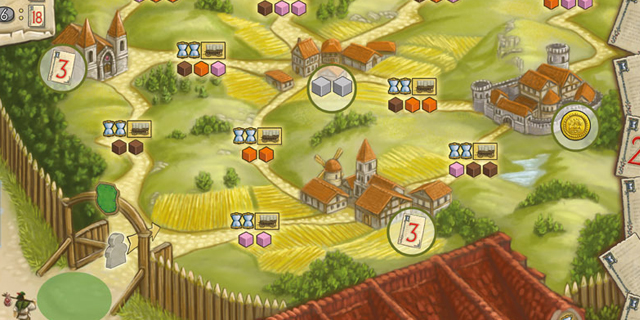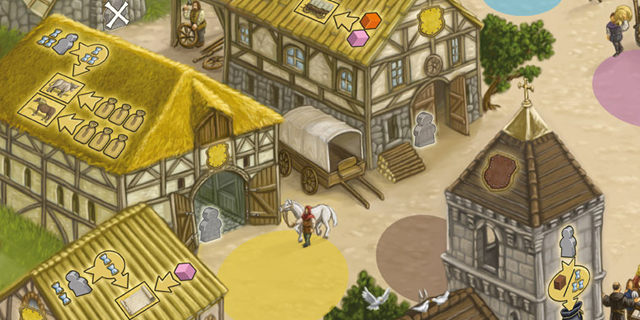
Inka and Markus Brand’s Village tells the tale of up to four generations of families in a small medieval village. Starting with four family members (and one coin), each player will have to manage actions, resources, and time itself as they attempt to write their own history in the village Chronicle. New family members can be added along the way, which is good since every one of your starting meeples will most likely have died before the game has run its course.
Yes, died. But I’ll get to that in a minute.
Village (published by Tasty Minstrel Games in the US) is not quite a worker-placement game in the traditional sense, as your meeples do not dictate the number of actions you can take each round. Rather, at the beginning of each round, a number of action cubes are randomly distributed to specific spaces on the central board. To perform an action, a player must take one of those cubes from the appropriate area. Colored cubes represent various types of influence that can be cashed in later (coins can be spent as wild cubes), but black cubes represent plague that will accelerate your time track two additional spaces (while also not providing any influence).
Actions include selling goods at the market, traveling the countryside to visit nearby towns, working in the town council, harvesting grain, putting a meeple into the monk bag, raising a new family member, or earning a good via artisan work. While most of these actions will require the use of one or more influence cubes, you can also trade in three identical cubes to gain an action at an area lacking real cubes… or maybe containing a plague cube that you would rather not take. That said, the round ends when the last action cube has been claimed from the board, so eventually someone has to take the plague cube(s).

At the end of the round, four meeples are pulled out of the monk bag for “mass”, which is how players actually get family members in the monk profession. Prior to this drawing, players have the option of paying one coin per meeple they wish to have pulled out of the bag without leaving it up to chance. There are four neutral meeples in the bag that are returned every round, so it is possible that nobody will gain a monk that round if no coins were paid. Other professions are filled more directly by a time investment during the corresponding action.
Each player’s farm board contains a time track. As actions are taken, time is spent by moving a token around that track. When it passes the starting point, one of your oldest meeples dies and is placed either in the Chronicle, depending on what profession it had upon death, or in one of the anonymous graves behind the church when the appropriate profession spaces in the Chronicle are already filled. When all available spaces in the Chronicle — or all of the available anonymous graves — are filled, each player gets one more action before the game ends.
Points are awarded for having a large number of meeples in the Chronicle, the number of neighboring towns visited, customers satisfied at the market, living meeples placed in the town council and church, and leftover coins. Incidental points can be scored along the way for having the majority in the church after each mass, visiting specific towns, and turning in coins at the town hall but most of the points will come at this endgame scoring.

What makes Village engaging are the wealth of choices. Nearly every action has sub-choices that need to be made. There are five different possible artisan actions, for instance, and for four of them you have the option of spending time and one of your meeples (which becomes apprenticed to that craftsman for a lower time commitment on future actions) or a couple of hard-earned cubes (or grain, depending) to get the good produced.
Goods, in turn, can either be sold at market, kept for utility (you get more grain per action if you have a plow and either a horse or ox), consumed in lieu of cubes to improve your station in the town council, or used to travel to a neighboring town depending on the type of good in question. An action in the town council can either move an existing meeple to a higher position and/or use any of the bonuses provided by their current or former position… the list goes on. Even your cubes bring multiple options, as they can be spent both to execute an action or to gain an additional one as outlined above. The flexibility of cubes is great enough that the ability to take a cube from an action you don’t want to complete is a viable choice for both increasing your options as well as denying an opponent the (free) opportunity to take that same action.
And then there is the matter of time. Investing a meeple into a profession always comes at a price, for every turn of time’s wheel means that one of them will die and any effort invested into getting it there will no longer pay off. You know which meeples are going to be the next to go (assuming they’re not hiding in the monk bag), but eventually you won’t have a choice as to which one dies and if you aren’t ready for it that can really set you back.

The fact that some professions give points at the end of the game only if alive combines in an interesting way with the bonus points for getting specific numbers of meeples into the Chronicle. Of course, these professions also provide powerful abilities while alive, and you might want access to them early on. But will the investment pay off before that bonus is taken from you by death itself?
A quick (if uncertain) play time, varied strategy, multiple paths to victory and unique mechanics add up to make Village a great experience whenever it hits the table. There is a lot going on here, and you might very well spend your first session overwhelmed by options, but the play itself is simple enough that this will soon give way to figuring out which strategy will serve you best this time. The random distribution of cubes each round can make life difficult, but this isn’t the monkey-wrench that it could be in other games thanks to the wealth of options at your disposal.
It is worth noting that Village won the 2012 Spiel des Jahres Kennerspiel (advanced game of the year, a new category recently added to supplement the more family-focused traditional Spiel des Jahres). This has put demand for the game amongst gamers at a crazy high, and as such Village might be tough to find for a while. When you can, it should retail for about $50.



















